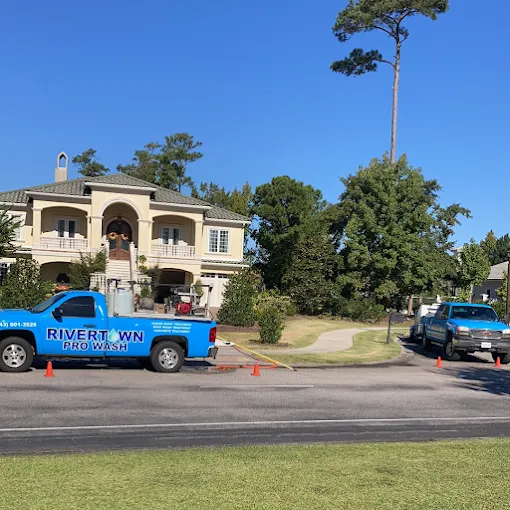Blog

Pressure Washing vs Soft Washing
Pressure washing and soft washing are two different methods of cleaning
These both can be used to remove dirt, grime, mildew and other types of debris from a variety of surfaces. One difference between the two methods is the amount of pressure used to clean the surface. The other difference is the way its cleaned.
Pressure Washing
Pressure washing uses high-pressure water, typically between 2,000 and 4,000 pounds per square inch (PSI), to blast away dirt and debris from hard surfaces such as concrete, brick, and stone. It's a highly effective method for removing stubborn stains and buildup, but it can also be damaging to certain surfaces if not used correctly. Pressure washing is best suited for surfaces that can withstand high-pressure water, such as driveways, sidewalks, and decks.

The pros of pressure washing include:
Highly effective: Pressure washing is an extremely effective method for removing dirt, grime, and stains from a variety of surfaces, including concrete, brick, and stone.
Saves time: Pressure washing can save a lot of time and effort compared to manual cleaning methods, which can be especially helpful for large surface areas.
Versatile: Pressure washing can be used on a wide variety of surfaces and can be adjusted to different pressure levels depending on the surface being cleaned.
Improves curb appeal: Pressure washing can improve the overall appearance of a property and increase its curb appeal.
However, there are also some potential downsides to pressure washing:
Damage to surfaces: If not used correctly, pressure washing can damage certain surfaces, such as wood, vinyl, and asphalt shingles. This can lead to costly repairs or replacement.
Safety hazards: Pressure washing can be dangerous if not handled properly, as the high-pressure water can cause injury to the operator or bystanders.
Environmental concerns: Pressure washing can create a lot of wastewater and can wash contaminants into storm drains and waterways, which can harm the environment.
Cost: The cost could be much more expensive than the original price due to the enormous amount of damage that can happen when done incorrectly.
Soft washing
Uses low-pressure water, typically less than 1,000 PSI, and a special cleaning solution to gently remove dirt and grime from surfaces such as roofs, siding, and stucco. Soft washing is a safer and more effective method for cleaning delicate surfaces, as the low pressure and cleaning solution do not damage the surface or strip away any protective coatings. Soft washing is also more environmentally friendly, as it uses less water than pressure washing.

Here are some of the pros of softwashing:
Effective cleaning: Softwashing is an effective method for cleaning dirt, grime, and other tough stains on surfaces. It can remove algae, mold, mildew, and other harmful substances that can damage the surface over time.
Safe for surfaces: Unlike pressure washing, softwashing is a gentle process that uses low-pressure water to clean surfaces. It is safe for delicate surfaces like roofs, siding, and windows, and reduces the risk of damage to the surface.
Long-lasting results: Softwashing not only cleans the surface but also helps to prevent the growth of algae, mold, and other harmful substances. This means that the results of softwashing can last longer than other cleaning methods.
Environmentally friendly: Softwashing uses eco-friendly cleaning solutions that are biodegradable and safe for the environment. This method is an excellent option for those who are conscious of their environmental impact.
Cost-effective: Softwashing is a cost-effective cleaning method that can save money in the long run by reducing the need for frequent cleaning and maintenance of surfaces. It can also increase the lifespan of a surface by removing harmful substances that can cause damage over time.
Overall, softwashing is an effective and safe cleaning method that can provide long-lasting results while being environmentally friendly and cost-effective.
Here are some of the dangers to Softwashing
Limited cleaning power: Softwashing uses low-pressure water to clean surfaces, which may not be enough to remove heavy stains or tough buildup. This means that softwashing may not be suitable for all types of surfaces or cleaning needs.
Requires specialized equipment: Softwashing requires specialized equipment, such as a soft wash system or a specialized nozzle for the pressure washer, which can be costly to acquire or rent.
Risk of damage to surfaces: While softwashing is generally considered to be a safe method for cleaning delicate surfaces, there is still a risk of damage if the pressure or chemicals used are not appropriate for the surface being cleaned. This risk can be mitigated by hiring a professional softwashing service with experience and expertise in the technique.
Time-consuming process: Softwashing can be a time-consuming process, especially if the surface being cleaned has a large area or requires multiple treatments. This can result in longer downtime for the area being cleaned, which may not be feasible for some businesses or homeowners.
Chemicals used in cleaning solutions: Some softwashing cleaning solutions may contain chemicals that can be harmful to the environment or to human health if not handled properly. It is important to use eco-friendly and safe cleaning solutions and to follow proper safety protocols when using them.
Overall, softwashing is a useful and effective cleaning method, but it may not be suitable for all types of surfaces or cleaning needs. It is important to carefully consider the potential problems and challenges associated with softwashing before deciding whether it is the right choice for your cleaning needs.
Summary
In summary, pressure washing is best suited for hard surfaces that can withstand high-pressure water, while soft washing is a more gentle and effective method for cleaning delicate surfaces. The choice between pressure washing and soft washing depends on the surface being cleaned and the level of cleaning required. It's always best to consult with a professional to determine which method is best for your specific needs.
Business hours
Monday 8 AM-5 PM
Tuesday 8 AM-5 PM
Wednesday 8 AM- 5 PM
Thursday 8 AM-5 PM
Friday 8 AM-5 PM
Saturday Closed
Sunday Closed
Pressure washing near me
Myrtle Beach, SC
Conway, SC
Aynor, SC
Surfside Beach, SC
Little River SC
Murrells Inlet SC





